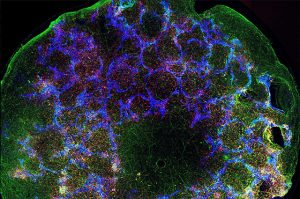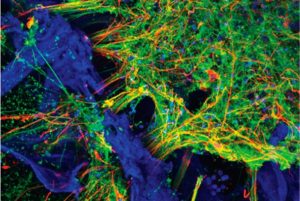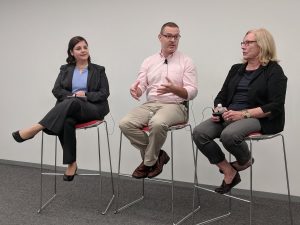The Connection Between Concussions, Viruses, and Alzheimer’s
Jan. 7, 2025
Researchers at Tufts suggest results may lead to preventive strategies using antiviral drugs after head trauma.
Green Tea and Resveratrol Reduce Alzheimer’s Plaques in Lab Tests
Nov. 1, 2022
Using a 3D neural tissue model, Tufts researchers find the compounds diminish amyloid plaques with no side effects.
Common Viruses May Be Triggering the Onset of Alzheimer’s Disease
Aug. 2, 2022
Shingles infection may activate dormant neurological herpes viruses, causing inflammation and accumulation of Alzheimer’s associated proteins in the brain.
INSciDE Director David Kaplan elected to National Academy of Engineering
Feb. 22, 2021
David Kaplan, the Stern Family Professor of Engineering, a Distinguished Professor, and chair of the Department of Biomedical Engineering, has been elected to the National Academy of Engineering in recognition of his contributions to silk-based materials for tissue engineering and regenerative medicine. Election to the National Academies is one of the foremost professional recognitions available to engineers, scientists, and medical experts.
3D brain-like tissue model links Alzheimer’s disease with herpes
May 6, 2020
Engineers and scientists led by Tufts University used a three-dimensional (3D) human tissue culture model mimicking the components and conditions in the brain to demonstrate a possible causal relationship between sporadic Alzheimer’s disease and herpes simplex virus I infection (HSV-1). Reported today in Science Advances, the model will allow for further studies into the causes and possible treatments of this devastating neurodegenerative condition.
Stem cells and silk make a new way to study the brain
Apr. 17, 2020
More than five million Americans, mostly sixty-five or older, suffer from Alzheimer’s disease (AD), and that number is expected to triple by 2060, as today’s twenty-somethings become seniors. No treatments exist for this devastating disease, and its root causes remain as tangled as the curious brain deformities that German physician Alois Alzheimer first described in 1906. Now a team of Tufts researchers from the School of Medicine and the School of Engineering has received a five-year, $5 million grant from the National Institute on Aging, part of the National Institutes of Health, to study the role of different cell types and mutations in AD. They will use a unique bioengineered “mini brain” that realistically simulates the human brain environment for years.
Scientists create brain-mimicking environment to grow 3D tissue models of brain tumors
Oct. 4, 2019
A team of Tufts University-led researchers has developed three-dimensional (3D) human tissue culture models of pediatric and adult brain cancers in a brain-mimicking microenvironment, a significant advancement for the study of brain tumor biology and pharmacological response. The study was published today in Nature Communications.
INSciDE researchers grow functioning human neural networks in 3D from stem cells

Oct. 18, 2018
A team of Tufts University-led researchers has developed three-dimensional (3D) human tissue culture models for the central nervous system that mimic structural and functional features of the brain and demonstrate neural activity sustained over a period of many months. With the ability to populate a 3D matrix of silk protein and collagen with cells from patients with Alzheimer’s disease, Parkinson’s disease, and other conditions, the tissue models allow for the exploration of cell interactions, disease progression and response to treatment. The development and characterization of the models was reported today in ACS Biomaterials Science & Engineering, a journal of the American Chemical Society.
INSciDE bioengineered 3D stem cell model discussed as part of NYSCF panel on Parkinson’s disease & stem cells: current & future treatments

Sept. 12, 2018
The New York Stem Cell Foundation (NYSCF) held an event to discuss the latest breakthroughs and new and developing treatments for Parkinson’s disease. The scientific panel talked about the collaboration with INSciDE to investigate how the gut-brain-immune axis contributes to neurodegeneration and how engineered 3D induced pluripotent stem cell (iPSC) models are used to study these complex systems in a dish.
Read about our collaboration >>